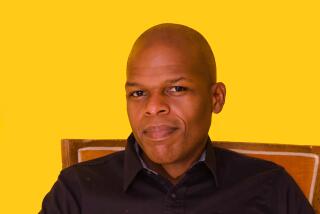Take a walk on the Parisian side with Lauren Elkin’s ‘Flâneuse’
Lauren Elkin’s “Flâneuse,” part cultural history, part personal memoir, fervently celebrates women who have asserted their freedom and sharpened their identities by taking to urban streets — whether on solitary, exploratory rambles or amid crowds of demonstrators. Although Elkin’s book went to press before the massive, global women’s rights marches that followed President Trump’s inauguration, she couldn’t have invoked a more apt postscript.
Elkin, like so many American college students, fell in love with Paris during a semester abroad — from Barnard in the late 1990s. She returned a few years later for graduate studies and eventually decided to live there permanently. After growing up in the isolating, soul-sapping car culture of suburban Long Island, she was charmed by Paris’ sense of history and nostalgia.
Exploring the city on foot through Montparnasse and beyond, Elkin fancied herself a flâneuse, a female version of that classic Parisian figure, the flâneur — an aimless wanderer and observer, “walking for no particular reason.” Yet she was surprised to learn that “scholars have mostly dismissed the idea of a female flâneur”; “flâneur-ing,” as she somewhat awkwardly calls it, was traditionally the prerogative of well-to-do men. In the 19th century, women out walking were more likely servants headed to market, or streetwalkers.
Elkin is certainly not the first to rue these “sexual divisions,” or to rail against the implicit notion that “a penis were a requisite walking appendage, like a cane.” But by focusing on six writers and artists — George Sand, Virginia Woolf, Jean Rhys, Agnes Varda, Sophie Calle and Martha Gellhorn — whose life trajectories were deeply influenced by their soles-to-the-pavement, eyes-on-the-street engagement with cities, her book makes a forceful case for the genderless joy and vital importance of striking out for the territory — on foot.
Following a growing trend in intellectual history, “Flâneuse” interweaves the author’s personal story with that of her subjects. Other recent examples of these personally inflected studies include Sarah Bakewell’s “At the Existentialist Café,” Katie Roiphe’s “The Violet Hour,” Elizabeth Hawes’ “Camus, a Romance” and John Kaag’s “American Philosophy.”
Reminders of a writer’s personal stake in her subject — along with the relative intimacy of first-person memoir — help offset potential dryness. But integrating the personal and scholarly can be tricky, and Elkin’s book occasionally suffers from tonal inconsistencies between research-heavy passages that read almost as if they were repurposed academic papers or lectures, and doleful accounts of the author’s “soul-scarring” love affairs.
Which is not to say that Elkin’s odyssey lacks interest. For starters, her astute portrait of suburban Long Island and the relief she felt on leaving it provides an apposite segue into her studies of two women in particular, Jean Rhys and George Sand, who also felt liberated upon moving to Paris. Elkin identifies with aspects of each of her subjects, extracting examples from their life and work that relate to her own experiences and feelings.
With Jean Rhys, née Ella Gwendolen Rees Williams in the West Indies in 1890, the unhappy relationships that fueled her novels — whose plots Elkin relays in excessive detail — provoke thoughts about “the addictive pleasure of despair” and Elkin’s misguided, insulting relationship with a “Jewish Patrick Dempsey,” for whom she was “not Jewish enough.”
George Sand was the pen name of Amandine Lucile Aurore Dupin, born in 1804. She was an “everyday radical” who challenged “received notions of morality” when she left her husband to live with a lover in Paris, where, cross-dressed, she was able to wander freely in disguise. Elkin’s fascination with Sand lies less in her sentimental novels and famous lovers (Alfred de Musset, Frederic Chopin) than in her role in the Paris uprisings of 1830 and 1848. For Elkin, public demonstrations are another salubrious aspect of urban living. She writes, “We need the mass movements, we need people to get together and march…You show yourself. You toss in your chips. You walk.”
A recurrent theme of “Flâneuse” is the pull between wandering and settling, illustrated most vividly with war journalist Martha Gellhorn’s story. Hemingway’s third wife, Elkin writes, “turned flânerie into testimony,” but she “pinged between extremes” of free-range activity and domesticity, often painfully.
Elkin, too, does some pinging. She follows a boyfriend from Paris to Tokyo, which makes her feel powerless and lonely. A month in Venice to research a novel doesn’t warrant the dull chapter she devotes to it. Time tracing Virginia Woolf’s tracks in London is better spent.
“Flâneuse,” in keeping with its peripatetic subject, jumps around, sometimes disorientingly: one paragraph, we’re deep in the filmography of nouvelle vague director Agnès Varda, the next we’re confronted with Elkin’s visa and job uncertainties. One moment, we’re in New York, the next, “here” is back in Paris, months (or is it years?) later, married and pregnant.
Elkin demonstrates her academic chops with a rich mix of references — to Baudelaire, Rebecca Solnit, Walter Benjamin, Joan Didion, Jean-Luc Godard. She also doesn’t shy from bold, sometimes debatable pronouncements: “There is no sharper truth than that of fiction,” she claims. Back in New York, she sees only “two speeds of life … married or very, very young,” which makes me want to urge her to look harder, and not just through the lens of her own preoccupations.
But “Flâneuse” is a stimulating read whose itinerary ranges from wanderlust and space as “a feminist issue” to self-definition in connection with a specific place. For Elkin, her chosen home is Paris, yet New York is still part of her identity. Not everyone, alas, male or female, has such freedom to choose.
In addition to the Los Angeles Times, Heller McAlpin reviews books regularly for NPR.org, the Washington Post and other publications.
“Flâneuse”
Lauren Elkin
Farrar, Straus and Giroux: 336 pp., $27
More to Read
Sign up for our Book Club newsletter
Get the latest news, events and more from the Los Angeles Times Book Club, and help us get L.A. reading and talking.
You may occasionally receive promotional content from the Los Angeles Times.






